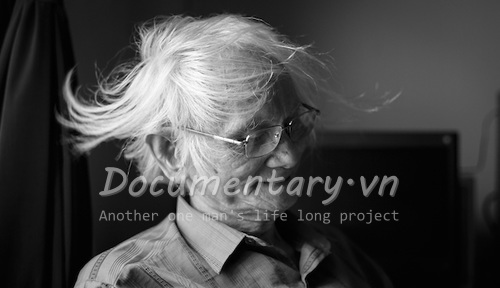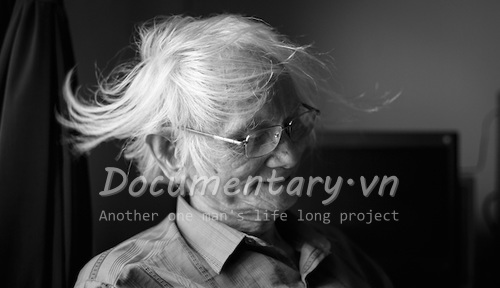
Few people know that before becoming a professor and doctor of science in Linguistics, Nguyen Lai was a man of literature. He graduated from the Faculty of Literature at Hanoi University in 1963. Initially, the Faculty intended to keep him as a lecturer and researcher in literary theory, because he had a tendency towards writing. I remember, the first time I met him, I vaguely recognized him as the author of a short story I had read quite a while ago, so I immediately asked:
- Sir, are you the author of a short story that was included in the book?Reading practice for 4th grade(The textbook used for students in the former liberated areas of South Vietnam) with the opening sentence: "Clang! Clang! Clang!...", right?
He looked at me excitedly and asked when I had read that story. I told him about the profound impression I had after reading his story. The story was called "Mrs. Tư the Stone."
When speaking of Nguyen Lai, generations of students and current staff of the Literature and Linguistics departments all retain the deepest impressions, considering him a kind and "exceptionally good" teacher to his colleagues and students. He was a teacher and a scientist whose humanistic qualities permeated every aspect of his soul and character.
Before becoming a scientist, Professor Nguyen Lai worked in many different environments. Born in the same year as the founding of the Indochinese Communist Party, he joined the Viet Minh at the age of 15. He later became a Communist Party member at 17. At 18, he assumed the position of Party Secretary of Phu Xuan commune, Dien Khanh district, Khanh Hoa province. After a year working locally, he was sent to secondary school and then transferred to the district to work in propaganda. In 1954, after the Geneva Accords were signed, he relocated to the North and was appointed Head of the Propaganda Department of the Reform Union of Thai Binh province and Hong Quang region. From 1957 to 1959, he continued his propaganda work in Phu Tho. Afterwards, he studied at the Faculty of Literature, Hanoi University. In 1963, after graduating, he was retained as a lecturer in literature.
After working at the Department for seven years, he was sent to teach Vietnamese as an expert in the German Democratic Republic. This was a special opportunity for him. Thanks to his diligent learning and accumulation of teaching experience, he determined his long-term professional path: to delve deeper into linguistic research.
During this period, due to the increasing demand for specialized Vietnamese language instruction for foreigners, he devoted himself to researching a group of verbs that indicate direction. He simultaneously taught and pursued postgraduate studies. Upon completing his teaching duties, he successfully fulfilled his responsibilities as a language teaching expert and defended his doctoral dissertation (now equivalent to a PhD) at Humboldt University, a prestigious university worldwide, on the topic of his doctoral thesis.Verbe der Richtung in der Vietnamesischen Sprache(Vietnamese verbs indicating direction).

Upon returning to Vietnam, he joined the Faculty of Literature, serving as Vice-Head and then Head of the Faculty (1979-1986). This was a period of great difficulty for the country. The South had just been liberated, and the bureaucratic, centrally-funded administrative system had not yet been abolished. The national economy was in a severe crisis. However, he, along with the Party Committee and the Faculty's leadership, steered the Faculty through these challenging times. Training and scientific research were maintained and developed. Although many negative aspects arose in society, the Faculty of Literature remained a healthy environment for teaching and learning. Students remained disciplined and enthusiastic about their ideals and their specialization. This was because the Faculty had exemplary teachers, among whom he was a model teacher in his ambition and revolutionary spirit in science and technology. While simultaneously holding leadership positions in the Faculty, participating in the University's Party Committee and the Scientific Council, Nguyen Lai still devoted his time and energy to delving into the field of semantics. He applied the fundamental principles of Marxist philosophy to the study of the relationship between the structure and meaning of directional words in Vietnamese, and developed the ideas formed from his associate doctoral dissertation. Another seven-year cycle followed the successful defense of his associate doctoral dissertation (1976-1983), after which he completed his doctoral dissertation in Linguistics (now a Doctor of Science). He sent the manuscript to a foreign country to await the day of his defense. He was absent for a year during his term as Dean of the Faculty and successfully defended his doctoral dissertation in 1984.
Having worked for many years in the German Democratic Republic, Nguyen Lai absorbed a very positive aspect of German thinking: the ability to generalize and summarize laws. Germany is renowned for its high level of philosophical thinking. A twist of fate bestowed this advantage upon Nguyen Lai. It also gave his research works a unique character, distinct from those of his colleagues in the field. On one hand, it is highly abstract, sometimes somewhat convoluted, but on the other hand, it possesses great depth and evocative power. Thanks to this, scientist Nguyen Lai has the stature of a true "elder" in the field. He is not only a member of the Scientific Council but also the Chairman of many important councils in the field. Furthermore, he participates in many international organizations such as GAL (Applied Linguistics Association - Federal Republic of Germany) and PALA (Poetics and Language Association - UK). He was also recognized as the Outstanding People of the 20th Century by the International Biographical Center in Cambridge. His strength lies in combining in-depth research with interdisciplinary approaches to find new ways to solve complex literary problems. Therefore, he delves into semiotic theory, hoping to explain some phenomena of poetics. Following an interdisciplinary approach, he has published several works relating language and literature, and language and thought, such as:Language and literary creation(Social Sciences Publishing House, 1991)Language and thought(Social Sciences Publishing House, 1991). He is also the author ofLectures on general linguistics(Vietnam National University, Hanoi Publishing House, 1997, reprinted 1999) and is the author of the work.Ho Chi Minh's Language Vision(Labor Publishing House 2007). These are also valuable works serving the training work at universities.
To me, Nguyen Lai was not only a scientist but also a man with a rich literary soul. It was thanks to this literary spirit that, in his daily life as well as in his research (his specialized field of linguistics, which is inherently dry), Nguyen Lai always displayed a gentle and poetic demeanor and writing style. During his time as head of the department, I know he rarely offended anyone, always knowing how to handle even the most challenging situations with composure. While teaching Vietnamese and defending his doctoral and postdoctoral dissertations in the German Democratic Republic, he wrote three short stories, which were translated into German. To date, in addition to his research papers on linguistics, he has published a novel.On the other side of the river, the strange buffaloand a collection of short stories for teenagers.The search for the pilot lieutenantSix of his stories have been translated into German and the former Soviet Union. Despite becoming a true linguist and a leading expert on directional words, he still had a deep connection to literature. This very characteristic created a sense of harmony between us. Now he lives almost half a country away from us, and he has aged considerably, but every time I think of him, I always remember him – my teacher – a scientist who loved literature and possessed a compassionate soul.
|
PROFESSOR, DOCTOR OF SCIENCE, PEOPLE'S TEACHER NGUYEN LAI
+ Workplace: Faculty of Literature (1963-1980). Department of Linguistics (1981-2003) + Management position: Head of the Faculty of Literature (1980-1985). Head of the Department of Linguistics - Theory and Application, Faculty of Linguistics (1986-1991). He was a member of the Society for Applied Linguistics of the German Democratic Republic and a member of the Society for Poetics and Linguistics of the United Kingdom (1991-2003).
+Vietnamese words indicating direction of movement, Textbook of specialized treatises, Hanoi University, 1990. +Language and literary creation, monograph, Social Sciences Publishing House, 1991. +Language and literary creation and reception, monograph, Education Publishing House, 1996, reprinted 1998. +Semantics of Vietnamese words indicating direction of movement, monograph, Social Sciences Publishing House, 2001. +The Vietnamese language and the great cultural figure Ho Chi Minh, monograph, Vietnam National University, Hanoi Publishing House, 2003.
+ Award from the Vietnam Linguistics Association for the workRevolution and science in Ho Chi Minh's linguistic perspective. |
Author:Assoc. Prof. Dr. Nguyen Huu Dat